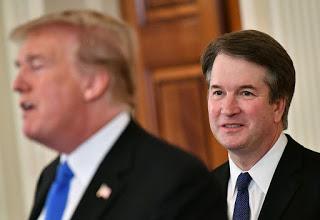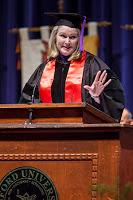
Donald Trump and Brett Kavanaugh
Americans this week are coming face to face with a harsh reality -- that our processes related to the federal judiciary are riddled with corruption, and it reaches to the highest level of government. The Trump administration ensured that issue would be front and center when it withheld more than 100,000 documents from the Brett Kavanaugh confirmation hearings, which begin today in Washington, D.C.Trump officials cited executive privilege as grounds for withholding documents from Kavanaugh's time as a lawyer in the George W. Bush administration, which likely was the most corrupt presidency in U.S. history -- until Trump himself came along. Senate Democrats said it was the first time the executive branch has invoked the Presidential Records Act to avoid handing over documents to Congress. Most rational Americans likely will realize what the White House's actions really mean -- that withheld documents would reveal Kavanaugh to be a partisan hack who is not remotely qualified to sit on the U.S. Supreme Court. Those Americans, perhaps thinking back to Trump's refusal to release his tax returns during the 2016 presidential campaign, likely will agree with Senate Minority Leader Chuck Schumer, who tweeted this about the Kavanaugh caper:
We’re witnessing a Friday night document massacre. President Trump’s decision to step in at the last moment and hide 100k pages of Judge Kavanaugh’s records from the American public is not only unprecedented in the history of SCOTUS noms, it has all the makings of a cover up.
Federal judges are supposed to be the last line of defense for the constitutional rights of everyday Americans. Corruption related to the judiciary -- whether it's the big-scale kind in the Kavanaugh hearings or the small-scale kind that produces baseless rulings victimizing middle- and lower-class Americans on a regular basis, gnaws at our democracy. My wife, Carol, and I have witnessed the small-scale kind of corruption, trampling our civil rights, more times than we can count. In fact, we recently were the victims of a judicial scam that was so brazen in its lawlessness as to almost be comical.
Here is the gist of what happened to us in the Northern District of Alabama: We moved for the disqualification of Judge Virginia Emerson Hopkins in our "Jail Case" -- providing a supporting affidavit, as required by law -- and the judge who ruled that Hopkins did not have to step down is related to an opposing party. And -- get this -- Presiding Judge Karon Bowdre found that to be perfectly OK.
We're not making this up. Imagine that you sued a man named Herman Blokes in the Northern District of Alabama. Imagine that a judge who is Mr. Blokes' uncle or cousin (or whatever) made a critical ruling in Mr. Blokes' favor. Finally, imagine that the chief judge of the district found such a ruling is squarely within the law. Would you call that "justice"? That's what federal judges in Alabama call it.

Karon Bowdre
Our grounds for disqualifying Hopkins for bias or prejudice -- under 28 U.S.C. 144 -- are spelled out in a motion and affidavit, both of which are embedded at the end of this post. Here is perhaps the central issue, from our affidavit:Judge Virginia Emerson Hopkins has demonstrated bias and prejudice in the instant case that is both “extrajudicial” and “pervasive” in her unlawful rulings.
A report titled "Money Trails to the Federal Bench," from the Center for Investigative Reporting (CIR) indicates Hopkins wound up on the federal bench because of the cold-hard cash she helped funnel to Sen. Richard Shelby (R-AL), with some also going to Sen. Jeff Sessions (R-AL), now attorney general in the dysfunctional Trump administration.
The CIR report states the following under the header: Hopkins, Virginia Emerson, U.S. District Court, Northern District of Alabama Nominated: October 14, 2003 | Confirmed: June 15, 2004
Summary: In May 2003, five months before her nomination, Hopkins and her husband, attorney Christopher Hopkins, each contributed $1,000 to Sen. Shelby, who strongly supported her nomination. On Halloween 2003, two weeks after Hopkins was nominated by the White House, President Bush received $2,000 from Hopkins’ husband. Sen. Sessions, also a backer of her nomination, later received $1,000 from husband Christopher Hopkins several months after her confirmation hearing before the Senate Judiciary Committee, of which Sessions is a member. Overall, Hopkins’ husband made nearly $9,000 in federal contributions between 2000-2004, with all but $500 going to Republicans.
Virginia Hopkins, formerly an attorney in private practice, gave President Bush $250 in 2000.
What does this tell us? Virginia Hopkins and her Anniston-attorney husband, Christopher Hopkins, bought a seat on the federal bench. The following chronology from the CIR report, along with a summary from our affidavit, makes that clear:
Chronology:*May 21, 2003: Shelby receives $2,000 total from Hopkins and her husband
* October 14, 2003: Bush nominates Hopkins
* October 31, 2003: Bush-Cheney campaign receives $2,000 from Hopkins’ husband
* November 19, 2003: Confirmation hearing in the Senate Judiciary Committee
* March 2, 2004: Sessions receives $1,000 from Hopkins’ husband
* June 15, 2004: Hopkins is confirmed by the Senate.
The summary? Christopher Hopkins made $9,000 in federal contributions just before, and after, his wife was nominated to the federal bench. Then, we see a regular money trail leading from Christopher and Virginia Hopkins to Richard Shelby, the Bush-Cheney campaign, and Jeff Sessions. All of these contributions came between May 2003 and March 2004, just before and after Virginia Hopkins was nominated. In essence, Christopher and Virginia Hopkins bought a seat on the federal bench, in a thinly disguised pay-to-play scheme and it had nothing to do with the nominee's judicial qualifications.
We learn that Virginia Hopkins owes her judicial seat to her allegiance (and financial contributions) to Richard Shelby, Jeff Sessions, and George W. Bush.
What impact does all of this have on our case? After all, that is the central question at hand. From our affidavit:
Why does this matter in the instant case? Almost every defendant in this case is tied, directly or indirectly, to Shelby, Sessions, and Bush – or all three. And I, Roger Shuler – on the blog Legal Schnauzer – have written numerous highly critical articles about these three prominent political figures (and their appointees or associates). In other words, I have shined unflattering light on the individuals who have supported, championed, and enhanced Judge Hopkins’ legal career – creating a deep animosity in her that is personal, extrajudicial, and way outside the four corners of the courtroom. Judge Hopkins has exhibited a consistent bias and prejudice toward Carol and me because we have unmasked the individuals (and their associates) who have been her personal boosters.
I figured even the Northern District of Alabama could not ignore Hopkins' obvious bias, and the money trail that helped produce it. But I was wrong.
Presiding Judge Bowdre assigned our Hopkins-disqualification motion to a senior federal judge named Lynwood Smith. When I received notice of that, I immediately did a face palm.
Why? We will address that in an upcoming post.
(To be continued)
